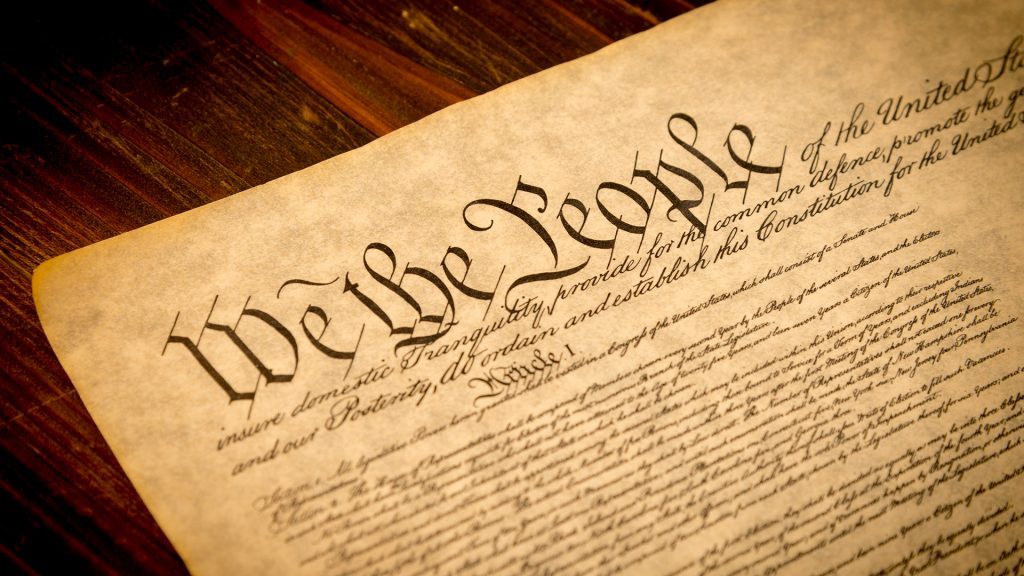
The Tablets of Madison
Why do American conservatives treat the Constitution as if It were holy scripture? The Founders certainly didn’t.
By Christopher Cook – September 16, 2023
Patriotic, conservative Americans take two premises as an article of faith:
- That our Founding Fathers enshrined the correct principles, and
- That the system they bequeathed us properly actuates those principles.
This then forms the kernel of an argument, the natural conclusion of which is that any political problems we have must be solely the result of bad actors’ corruption of that system.
If the premises are true, then it makes sense to conclude that all we need to do to fix things is to vote out the bad guys.
Let us set aside the question of whether or not it would ever be possible, within the system, to be fully rid of any such “bad guys.” All the evidence before our eyes ought to tell us that such a thing is not possible, but again, set that aside for now and ask a more basic question:
What if one of the premises above is simply not true?
I propose that the first premise is true. The Founders’ classical-liberal principles were natural law’s ideological and political actuation. Natural law is not only true, it is universally true. It is the same in every corner of this world, galaxy, and universe. The American Founders knew as much. Whether or not they stated those principles with the maximum possible philosophical precision does not matter.
Heuristically, they had it right.
By contrast, I propose that the second premise is false. I do not believe the system they bequeathed us properly actuates those principles.
As I have offered in previous writings, ad nauseam, let me again make the following disclaimer…
The system they gave us was uniquely brilliant—the best of its kind before and since—and I do not believe that they could have, given their circumstances and historical context, done any better. Okay? This is not Founders-bashing day. I love them as much as you can love anyone who died two centuries ago. I am grateful to live—and to have lived my life—in the country they left us.
Yet I do not believe that the system they gave us properly actuates liberal principles.
Some—patriotic conservatives especially—react to such a statement as if it is literal heresy. An act of apostasy that is simply out of bounds. Why? Why is it not okay to say this? Why must we absolutely hold the Constitution as perfect…or at least as the best possible option humanity can ever devise?
The Founders themselves certainly did not consider it so. Half the Founders—the Anti-Federalists—disliked it. (Do you like having the Bill of Rights? I do. Arguably, it is the best part of the Constitution. We would not have the Bill of Rights if not for the Anti-Federalists.) Some of those who ended up ratifying the Constitution did so reluctantly. Opinion among newly independent Americans was by no means unanimous on the subject. Even the pro-Constitution Federalists were compelled to write an extensive series of complex arguments in an effort to convince people, and when reading the Federalist Papers, it sometimes seems as if they were also trying to convince themselves.
In short, one side ended up winning a very political argument and the Constitution came into being.
Why have conservatives turned this contentious political compromise into a sacred text, beyond criticism? Is it just the conservative temperament—the urge to conserve anything that is old? Is it because we have come to believe that this is the best we can ever do?
It isn’t. There are many ways to critique the Constitution and the constitutional order that has sprouted.
Lysander Spooner argues that the Constitution authorized the authoritarianism under which we now languish, or at least that it was powerless to stop it. Spooner’s logic seems inescapably true. If either of those claims is true, then the Constitution has failed to do what the Founders intended.
At least one of those things is definitely true. Probably both.
There is also this much more basic critique:
The Founders clearly believed that no government was legitimate unless it had the “consent of the governed,” and then they proceeded to give us a government to which no one consented! No American, other than the state delegates who ratified the Constitution, agreed to be governed this way, nor has any person since.
We are offered the fact that we can vote for (and run to become) politicians as the solution to this puzzle. It is no such thing. You can vote until you are blue in the face and still have all sorts of things done to you, to which you do not, and would never, agree. That is not consent by any reasonable definition of the word. People can keep repeating, over and over, that it is consent, but that does not make it true.
Most people have not heard of any alternatives, or thought of any themselves, and thus assume that this is the closest we can come to a consensual system. Failure of imagination does not make it so. The Founders, given their moment in history, did not—and possibly could not—think of anything else. That does not transform voting into consent.
The Founders have many principles, but the notion of consent is central to all of them. Violations of consent are violations of inalienable human self-ownership, and self-ownership is at the center not only of our concept of rights but of our very being. Without it, we are, as Ernst Cassirer noted, merely “lifeless things.”
